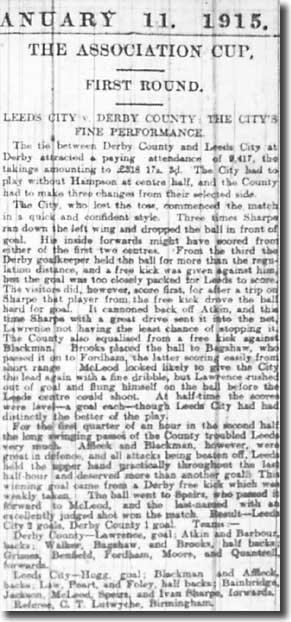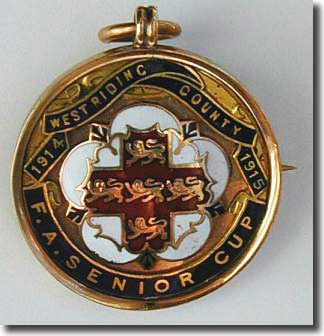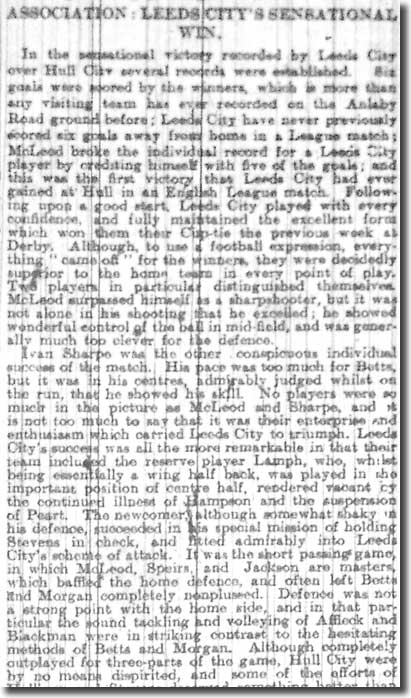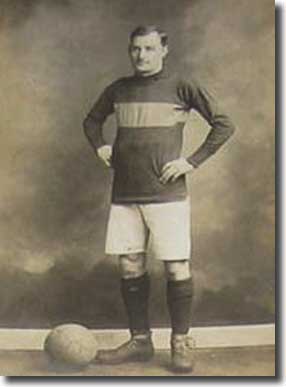 |
 |
 |
 |
 |
 |
 |
 |
 |
Second Division - Anlaby Road - 5,000
Scorers: McLeod 5, Sharpe
Hull City: Hendry, Betts, Morgan, Edelston, Deacey, Wright, Mercer, Cameron, Stevens, Halligan, Lee
Leeds City: Hogg, Blackman, Affleck, Law, Lamph, Foley, Bainbridge, Jackson, McLeod, Speirs, Sharpe
On 12 December, the Peacocks hammered
Leicester Fosse 7-2; a week later they lost at Barnsley but
then recovered to beat Glossop twice over Christmas, 3-0 on each
occasion. A 3-1 defeat at home to Stockport demonstrated the brittleness
of their nascent revival, but when City won 2-1 at table topping
Derby County in the first round of the FA Cup on 9 January they
confirmed an undiminished ability to mix it with anyone on their
day. The Leeds Mercury reported the Cup victory thus. 'On returning
to Leeds from Derby on Saturday evening, I met a jubilant City supporter.
"When I saw the score was one each at half time," he said, "I
was immensely pleased, and when I saw they had won I could not believe
it." 'There is not the least doubt that the result would be a surprise to
99 per cent of the football community. It is true Leeds City had beaten
Derby County at Derby, in October, by exactly the same score (2-1), but
that stood as Leeds City's solitary away victory of the season, and since
then Derby County had played fourteen games without suffering defeat,
winning eleven and drawing three, whereas Leeds City had played thirteen
games, and won only five of them, against five defeats. 'Leeds City are to be congratulated on thus confounding the critics.
They played well, undoubtedly, but Derby County gave an astonishingly
weak display, a display that would not have done credit to a Midland League
side, and the surprising feature about the game was not that Derby County
were beaten, but that Leeds City did not win a lot more easily. 'There was some excuse for Derby County. Eadie,
their centre half-back, was absent, as he is under suspension, and at
the last moment it was found that Leonard, the crack centre-forward, and
Baker, the outside-left, were unable to take the field owing to influenza.
Three reserves had therefore to be called upon, but this alone does not
explain the poor display of the side. The regular members of the team
must be suffering from the strains of their struggle to keep the leadership
of the League. There was not much fault to be found with the forwards,
but the half-backs and backs were unaccountably weak, and were largely
to blame for the downfall of the side. Their kicking and placing was very
poor, even allowing for the heavy ground and the greasy ball. 'Leeds City were vastly superior in defence. Hogg was very safe in goal,
but had a very easy time of it in the second half. Blackman was not quite
steady in the early stages of the game, but he improved as time went on
and was very sound in the second half. Affleck was in good form all through
the piece. He was daring in his tackling, but he got there, and he kicked
with power and judgement. 'The half-backs were also very effective. Law in particular played well,
and Peart and Foley worked very hard, Peart making up for his lack of
inches by his pluck and grit. He was a good substitute for Hampson, and
it is rather singular that Peart also played in the match against Derby
County in October.' City had started to edge away from the Second Division re-election
zone and the nature of their victory at the Baseball Ground left
them in great heart for a Yorkshire derby at Hull City's Anlaby
Road on 16 January. Previous clashes will Hull had usually been
hotly contested affairs, though Leeds had won only once in the
League since October 1910 and had never won at Anlaby Road, where
they were hammered 6-2 in November 1912. However, they could recall
with pleasure the memory of beating Hull on 11 November 1914 to
win the West Riding Cup for the first time in their history. Yorkist in the Leeds Mercury: 'For the first time on record Leeds
City have beaten Hull City in a Cup-tie, the final of the West Riding
competition at Elland Road yesterday, resulting in a win for the home
team by a goal to nil. 'What had given promise of being a very interesting contest was almost
entirely ruined by wretched weather. Heavy rain had fallen all day, and
continued nearly throughout the match. It was no surprise there was only
a small attendance, the number paying for admission being 830 and the
receipts being under £30, which would barely pay expenses. It was a thoughtful
action on the part of the Leeds City management to allow the sixpenny
patrons access to the shilling stand soon after the start of the game,
so that all the spectators were under cover. 'Despite the conditions, however, the players entered into the contest
seriously, and there was a lot of interesting football. The spectators
occasionally derived amusement from the mud baths of some of the players
and twice in the first half Edelston, the Hull City right-half, had long
toboggan journeys in a sitting posture. 'An unfortunate feature of the match was that Mr Sant of Barnsley, who
refereed, ordered Hampson, the Leeds City centre-half, off the field in
the second half for what seemed a trivial offence against Halligan, the
Hull City inside-left and captain, and the former Leeds City player. 'No one was more surprised at the action of the referee than Halligan,
who, along with other players on each side, appealed to the referee to
recall Hampson, but Mr Sant adhered to his ruling, much to the annoyance
of the crowd. 'It was after Hampson had been sent off that Leeds City got the winning
goal and there was thus all the more credit in Leeds City's victory. They
were the smarter side all through the piece, adapting themselves much
better to the heavy ground than the lighter Hull City men. 'To Speirs fell the honour of scoring Leeds City's goal, the ball going
to him at close range after McLeod had 'Speirs, Sharpe and Bainbridge were the best of the Leeds City forwards,
though McLeod and Jackson were by no means idle. The Leeds City half-backs
were sound, Hampson playing well till his departure. When he left, Jackson
dropped back to centre-half, and acquitted himself creditably in that
position, though handicapped by lack of inches. 'Blackman and McQuillan were stalwart
defenders, McQuillan, in particular, giving a fine display against his
old colleagues. He nearly scored in the second half with a long shot from
his own half of the field, the ball bouncing awkwardly to Hendry, who
could do no more than divert it over the bar. Hogg had a comparatively
quiet time in the Leeds City goal. 'On the Hull City side Turner was absent from the centre-half position,
Wright going from left-half to centre-half, with Morgan dropping back
from inside-left to left-half, while Lee took Morgan's place. Halligan
and Lee were Hull City's best wing, though Mercer and Cameron were occasionally
clever, but Stevens was not as prominent as usual in the centre. 'Morgan played well at left-half, but Edelston was the pick of the line.
Pattison was the better of two useful
backs, but Hendry was not quite comfortable in goal, though he had no
chance of stopping Speirs' shot. It would not be fair, however, to seriously
criticise players under the prevailing conditions. 'Mr Joseph Connor, the president of the West Riding Association, handed
over the trophy at the close to Speirs, and presented the medals to the
players of both teams.' The FA Cup-tie at Derby had marked the start of a particularly
testing period for Leeds. After the trip to Hull there were three
successive away engagements: Blackpool, Queens Park Rangers (in
the Cup) and The Arsenal, the last-named pushing hard for promotion.
Later an additional game at Elland Road, against Clapton Orient,
was added into the schedule the week before the game at Highbury. In the context of that run and City's recent form, the Yorkshire Evening
Post commented pragmatically, 'They have a hard row to hoe during
the next four weeks … They will be cheered in their difficult task if
they can but succeed in sharing the points tomorrow, as, on form, they
should do.' Regular centre-half Jack Hampson was unavailable with a particularly
debilitating bout of flu and his deputy, Harry Peart, who had
played so well at Derby, was unavailable through suspension. City manager Herbert Chapman
responded to the crisis by calling up wing-half Tommy Lamph Hull, for their part, were still without injured right-back John
Pattison (who was to play briefly for Leeds a couple of years
later) and Arthur Betts continued to deputise, with the side unchanged
from that which put mighty West Bromwich Albion out of the FA
Cup the previous weekend. Freewebs.com: 'West Bromwich Albion were always second best at
promotion chasing Hull, who should have already been in front before their
legendary forward Sammy Stevens broke the deadlock. Keeper Nick Hendry,
nicknamed The Human Octopus, then stepped in with an excellent second
half display to keep Albion out. The Tigers went on to see off Northampton
and Southampton before bowing out in the quarter finals against Bolton.
Sadly the war broke up their side before they could mount another challenge
for promotion and a team that included Irish International Billy Halligan
was broken up. Also in the side was Joe Edelston, whose son Maurice later
became BBC radio's anchor commentator for the Cup final itself in the
late Sixties and early Seventies.' Despite the attraction of a local derby, it was 'witnessed by a crowd
of only about 5,000 spectators, of whom nearly half were soldiers in khaki',
according to the Yorkshire Post. 'Taking the lead in the first
minute, Leeds City were always on top and except for a period of about
ten minutes immediately after the interval they quite monopolised the
play which was contested throughout at a great pace, despite the heavy
conditions.' The opening goal came directly after the kick off, as reported by Yorkist
in the Leeds Mercury: 'The game had a most sensational opening,
as Leeds City got the lead before a single one of the Hull City players
had a kick at the ball. Halligan had beaten Speirs in the toss, and Leeds
City had to face a troublesome breeze. 'McLeod, in starting the game, sent the ball wide out to Sharpe, who
promptly lofted it over the heads of the Hull half-backs. Betts ought
to have got to it in time to clear, but the left-back hesitated and Speirs
reached it first. He immediately passed the ball inside to McLeod and
the Leeds City centre-forward could not have been more than five seconds
in progress and naturally everybody was taken by surprise. The goal gave
Leeds City confidence, and despite having to play against the wind they
had the better of the exchanges to That stunning opening undermined Hull badly, but Halligan almost
managed an immediate equaliser, missing what was practically an
open goal. It was a rare moment of promise for the home side and when Leeds
came again they did so with verve and style, their forwards combining
in stunning fashion on several occasions. Sharpe was denied by the crossbar when he fired in a spectacular,
swerving drive, but his side were not to be rebuffed for long.
The persistent probing saw them increase their lead after half
an hour. Speirs and Bainbridge combined well on the right to feed McLeod
who sent the ball on to Sharpe on the left. A mistake by the covering
Betts allowed the England amateur to get away and McLeod got his
head to a fine cross and nodded home his second goal. That was the signal for Hull to rally: in the 38th minute, after
forcing a corner which was only partially cleared, Halligan fired
a shot against Fred Blackman.
The full-back was slow to recover and Sammy Stevens had time to
fire home the loose ball. Their recovery was nearly completed
when a fine drive by David Mercer struck the bar, but Leeds were
worth their half time advantage of 2-1. The first ten minutes following the resumption went the way of
Hull, but they wasted a number of scoring opportunities thanks
to indecision in front of goal. Their best opportunity came when
Stevens struck the foot of the upright with a raking shot. Then
Leeds keeper Tony Hogg was twice pressed hard before he could
throw the ball out and Stevens got possession, beat Tommy Lamph
and George Affleck and got in a shot which ran narrowly wide. Having withstood some determined assaults, the Peacocks responded
by increasing their lead in the 62nd minute. Full-back Doug Morgan
failed to clear a corner kick and John Jackson seized on the opportunity
to make an opening from which McLeod was able to complete his
hat trick. That served only to whet Leeds' appetite for more goals and they
scored again with around twenty minutes remaining. Hull forced
a corner which was well placed by Jack Lee, but Fred Blackman
headed away. McLeod got to it and lofted a long ball out for Ivan
Sharpe to chase with practically an open field in front of him.
He was partially checked in his advance by Betts, but recovered
possession to break away and finished off a good run by beating
goalkeeper Hendry from close range to make it 4-1. Five minutes later a centre from Bainbridge allowed McLeod to
beat Morgan and fire home his fourth and City's fifth goal. At that stage, Jimmy Speirs was forced to retire with a badly
swollen knee and the Peacocks had to see out the final fifteen
minutes with ten men. With eight minutes of time remaining Billy Halligan pulled a
goal back for Hull following a great run by Mercer, but that only
prompted the visitors onto the attack. Within a minute, it was the redoubtable McLeod once more, crowning
a fantastic personal performance by scoring his fifth goal of
the game after good build up play by Jackson and Bainbridge. A number of records were established by this astonishing game. It was
the first occasion on which any visiting team had scored six goals at
Anlaby Road, the site to which the club returned in December 2002 when
they left Boothferry Park for the newly-built KC Stadium. Leeds had never
scored six away from home in a League match and never beaten Hull on their
own enclosure. McLeod's five goals were the highest by a Peacocks player
in a single game, beating the four the same player managed against Nottingham
Forest in November 1913. That haul matched those of Fred
Hargraves and Dickie Morris against
Morley in the FA Cup in October 1905 and David
Soldier Wilson against Clapton Orient in March 1906. The Yorkshire Post: 'Following upon a good start, Leeds City played
with every confidence and fully maintained the excellent form which won
their Cup-tie the previous week at Derby. Although, to use a football
expression, everything came off for the winners, they were decidedly superior
to the home team in every point of play. Two players in particular distinguished
themselves. McLeod surpassed himself as a sharp shooter, but it was not
alone in his shooting that he excelled; he showed wonderful control of
the ball in midfield, and was generally much too clever for the defence.
Ivan Sharpe was the other conspicuous individual success of the match.
His pace was too much for Betts, but it was in his centres, admirably
judged whilst on the run, that he showed his skill. No players were so
much in the picture as McLeod and Sharpe, and it is not too much to say
that it was their enterprise and enthusiasm which carried Leeds City to
triumph. 'Leeds City's success was all the more remarkable in that their team
included the reserve player Lamph, who, whilst being essentially a wing
half-back, was played in the important position of centre-half, rendered
vacant by the continued illness of Hampson and the suspension of Peart.
The newcomer, although somewhat shaky in his defence, succeeded in his
special mission of holding Stevens in attack, and fitted admirably into
Leeds City's scheme of attack. 'It was the short passing game, in which McLeod, Speirs and Jackson are
masters, which baffled the home defence, and often left Betts and Morgan
completely nonplussed. Defence was not a strong point with the home side,
and in that particular the sound tackling and volleying of Affleck and
Blackman were in striking constant to the hesitating methods of Betts
and Morgan. Although completely outplayed for three parts of the game,
Hull City were by no means dispirited, and some of the efforts of Halligan
and Stevens deserved something better than the hard luck with which they
were attended.' Yorkist in the Mercury: 'For the second Saturday in succession,
Leeds City startled the football world, and their performance at Hull
was even more amazing than that at Derby. Who would have deemed that a
Second Division side could score six goals against Hull City on the Hull
City ground? This is what Leeds City accomplished. 'This latest performance of Leeds City was much more meritorious than
their Cup triumph at Derby. Leeds City won at Derby not by reason of their
own brilliance so much as the astounding weakness of their opponents.
But Leeds City did play magnificent 'They were a great side all round, more especially in the second half,
and five of their six goals were thoroughly well-deserved. It was an extraordinary
game, and by no means as one sided as the score indicates, for it was
not until the last half hour that Leeds City gained the mastery, but even
then Hull City never ceased to persevere. 'Leeds City's display was a revelation, and was certainly the best they
have provided this season. The forwards were not convincing at Derby,
but they were all on the top of their form on Saturday, and were admirably
assisted by the half-backs and backs. 'McLeod had a great day, and he was cleverly supported by Speirs and
Sharpe on the one wing and Bainbridge and Jackson on the other. It is
pleasing to know that the injury to Speirs is not likely to prove serious
enough to keep him out of the team. 'Law and Foley did splendid work at half-back, and the experiment of
playing Lamph at centre-half was a success, the youngster giving a pleasing
display. He pluckily shadowed the bustling Stevens, and never allowed
him much rope. With a little more weight and experience Lamph should develop
into a first rate player. 'As at Derby, Blackman and Affleck distinguished themselves in defence.
They were sound throughout and scarcely made a mistake, while there was
little fault to find with the work of Hogg in goal. There was not a weak
spot on the side. 'Hull City had the same side as triumphed over West Bromwich Albion in
the Cup-tie, and the victory of Leeds City was therefore all the more
remarkable. Though Hendry had six goals scored against him, he could not
be blamed for any one of them. Betts, who again deputised for Pattison
at right-back, was below form, but Morgan was invariably sound. Edelston,
Deacey and Wright had a gruelling time at half-back, but they worked hard
throughout. 'Of the forwards, Cameron was the least conspicuous, but he was lamed
early in the game and could not do himself justice. Halligan and Mercer
were the pick of the line, but Stevens and Lee also did good work.' Unfortunately, the comprehensive victory produced no sustained
improvement for the Peacocks and they lost their following five
games. That included Derby County exacting revenge for their Cup
exit by winning 5-3 at Elland Road on 13 February. Curiously they
then won four games on the bounce before losing six of their final
eight fixtures in this most inconsistent of seasons. Manager Herbert
Chapman could be excused for feeling beside himself with frustration. Stephen Studd in Herbert Chapman: Football Emperor: 'Leeds finished
a poor fifteenth in the Second Division in 1915.Wartime conditions had
robbed players of the incentive to win promotion because of the uncertain
future of League football, and caused a sharp fall in gates which made
it virtually impossible to spend money on improving the team. Set against
wage reductions and the receipt of several hundred pounds from the League
Relief Fund was an average gate yield of less than £200. But other clubs
facing similar conditions had done better than Leeds. And the factory
hours and Rugby support which militated against soccer in Leeds had been
challenged with some success from 1912 to 1914. 'A more likely explanation for the slump can be found in the shaky financial
structure of the club, which made it hard for Chapman to act with any
confidence. For some time financial control had been in the hands of a
receiver after the Leeds City company was wound up.' After a thoroughly depressing run through the autumn of 1914, the
turn of the year brought a promising upturn for Leeds City.
After a thoroughly depressing run through the autumn of 1914, the
turn of the year brought a promising upturn for Leeds City. endeavoured
to force his way between the Hull City backs. The goal recalled the famous
English Cup final replay at Manchester, when Bradford City beat Newcastle
United. Speirs scored the goal on that occasion. He was then captain of
Bradford City and is now captain of Leeds City.
endeavoured
to force his way between the Hull City backs. The goal recalled the famous
English Cup final replay at Manchester, when Bradford City beat Newcastle
United. Speirs scored the goal on that occasion. He was then captain of
Bradford City and is now captain of Leeds City. from
the reserves. It was something of a risk as Lamph was untried
in the position and could have been identified as a weakness by
Hull City, with former Peacocks
forward Billy Halligan intelligent enough to exploit any uncertainty.
from
the reserves. It was something of a risk as Lamph was untried
in the position and could have been identified as a weakness by
Hull City, with former Peacocks
forward Billy Halligan intelligent enough to exploit any uncertainty. the interval.'
the interval.' football
on Saturday, and the score of 6-2 does not unduly flatter them.
football
on Saturday, and the score of 6-2 does not unduly flatter them.